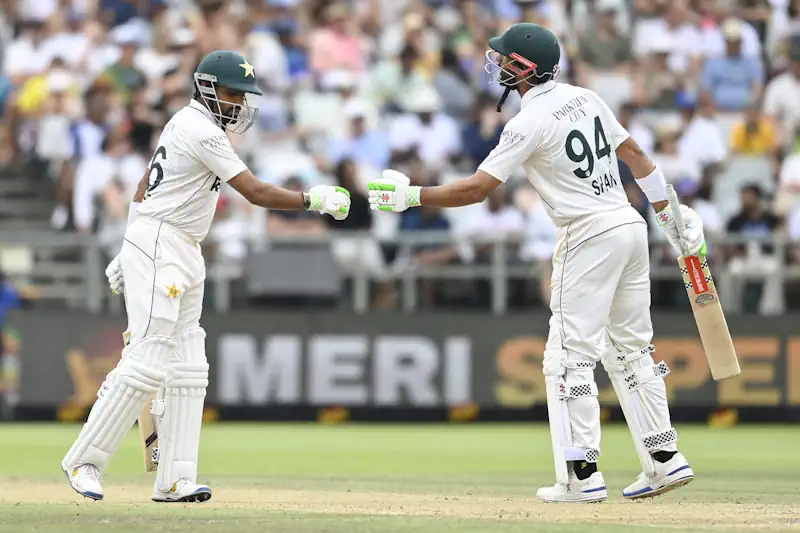
Pakistan’s Test captain Shan Masood and former skipper Babar Azam made history with a remarkable opening stand on Day 3 of the second Test against South Africa at Newlands, Cape Town. The duo’s record-breaking partnership not only revived Pakistan’s fading hopes but also etched their names in the history books with multiple milestones.
After being forced to follow-on, Pakistan faced a daunting task on a pitch that had previously favored South Africa. However, Shan and Babar displayed remarkable grit and skill, crafting a 201-run opening partnership—the highest by any opening pair during a follow-on in Test cricket.
South Africa, in a commanding position after dismissing Pakistan for a paltry total in their first innings while chasing a massive 615-run target, became the first team in the ongoing World Test Championship (WTC) cycle to impose a follow-on twice. The Proteas had previously enforced a follow-on against Bangladesh in Chattogram.
Expecting a quick finish, South Africa’s decision to enforce the follow-on backfired as Shan and Babar launched a spirited fightback on a benign Newlands surface. The left-right batting combination proved to be a masterclass in resilience and determination, frustrating the hosts with their flawless strokeplay.
Shan Masood stood out with his captain’s knock, becoming the first Pakistan skipper to score a Test century in South Africa. He ended Day 3 unbeaten on 102, a momentous feat that had eluded previous Pakistani captains.
Before Shan’s achievement, Salim Malik came closest with a 99-run knock in Johannesburg in 1995, while Inzamam-ul-Haq was left stranded on 92 in Gqeberha in 2007. Shan’s century marked a significant milestone, reflecting his leadership and determination to steer Pakistan out of trouble.
Babar Azam, who has been in sublime form in South Africa, once again displayed his class with a well-crafted 81. His second-innings knock followed two consecutive fifties in the series, making it the first time in his career that he scored three successive half-centuries without converting any of them into a century.
Despite falling short of a hundred, Babar’s contribution was invaluable in stabilizing Pakistan’s innings. His partnership with Shan provided a solid foundation, preventing South Africa from capitalizing on their early advantage.
The day also saw a historic moment for South Africa as 18-year-old fast bowler Kwena Maphaka made his Test debut. At just 18 years and 272 days, Maphaka became the youngest South African to take a wicket in the Test format, dismissing Babar Azam to achieve the milestone.
Maphaka’s impressive debut highlighted South Africa’s commitment to nurturing young talent, with the pacer showing glimpses of his potential on the big stage.

